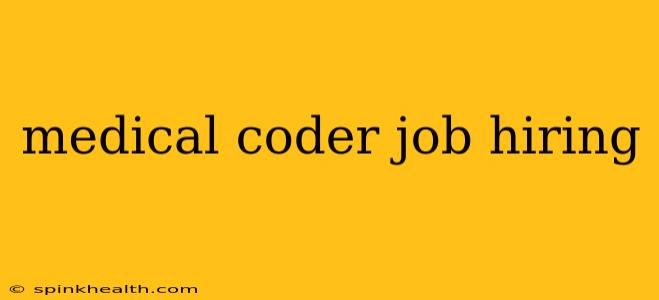Cracking the Code: Your Guide to Landing a Medical Coder Job
The world of healthcare is vast and complex, but behind the scenes, a crucial role ensures smooth operations: the medical coder. These unsung heroes translate medical diagnoses and procedures into standardized codes, facilitating billing, data analysis, and overall healthcare management. If you're keen on a rewarding career with excellent job prospects, a medical coding job might be your perfect fit. But how do you navigate the hiring process and land your dream role? Let's unravel the mystery.
My name is Sarah, and I've spent over a decade working in medical coding, both as a coder and a hiring manager. I've seen countless resumes and interviewed hundreds of candidates. Let me share my insider knowledge to help you succeed.
What Does a Medical Coder Actually Do?
Before we dive into the hiring process, let's clarify the role. Medical coders analyze patient medical records, identifying the diagnoses, procedures, and services provided. They then assign specific codes from standardized systems like ICD-10 (International Classification of Diseases, 10th Revision) and CPT (Current Procedural Terminology) to these records. Accuracy is paramount, as these codes directly impact patient billing and reimbursement. It's a detailed, analytical role requiring a sharp eye for detail and a solid understanding of medical terminology.
What are the Essential Skills for a Medical Coder?
This isn't just about knowing codes; it's a multifaceted role. Employers look for:
- Proficiency in ICD-10 and CPT coding: This is foundational. You'll need to demonstrate a thorough understanding and the ability to apply these codes accurately.
- Medical Terminology and Anatomy: You need to grasp the language of medicine to decipher medical records effectively.
- Strong Analytical Skills: Medical records can be complex. You must be able to analyze information quickly and accurately to identify the correct codes.
- Attention to Detail: A single incorrect code can have significant consequences. Accuracy is non-negotiable.
- Computer Skills: Medical coding is often done using specialized software, so computer literacy is essential.
- Excellent Communication Skills: You may need to interact with physicians, other healthcare professionals, and billing staff.
How to Find Medical Coder Jobs?
Job hunting can be overwhelming. Start with these strategies:
- Online Job Boards: Indeed, Monster, LinkedIn, and specialized healthcare job boards are great starting points.
- Networking: Attend healthcare industry events, connect with professionals on LinkedIn, and inform your network of your job search.
- Company Websites: Check the career pages of hospitals, clinics, physician practices, and medical billing companies.
What Questions Should I Expect in a Medical Coding Interview?
Interview questions will test your technical skills and soft skills. Be prepared for:
- Technical Questions: Expect questions related to coding guidelines, specific code applications, and scenarios requiring code selection.
- Situational Questions: Prepare examples demonstrating your ability to handle challenging situations, such as dealing with ambiguous medical records or resolving coding discrepancies.
- Behavioral Questions: They will assess your work style, problem-solving approach, and ability to work in a team. Use the STAR method (Situation, Task, Action, Result) to structure your answers.
What is the Average Salary for a Medical Coder?
Salary varies by experience, location, and employer. Research salaries in your target area to get a realistic expectation. Entry-level positions usually offer a competitive starting point with room for growth based on experience and certifications.
What Certifications are Helpful for Medical Coders?
While not always mandatory, certifications like the Certified Professional Coder (CPC) demonstrate competency and enhance your job prospects.
How Can I Prepare My Resume and Cover Letter?
Highlight your relevant skills and experience using keywords employers commonly search for. Quantify your accomplishments whenever possible. A strong cover letter should showcase your passion for medical coding and explain why you're a good fit for the specific role and company.
Landing a medical coding job requires preparation and effort. By understanding the role, developing the necessary skills, and crafting a compelling application, you can significantly increase your chances of success. Remember to stay updated on industry changes and continue learning to advance your career. Good luck!

